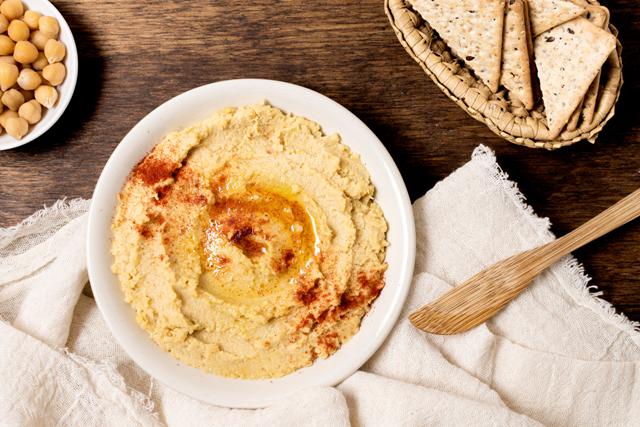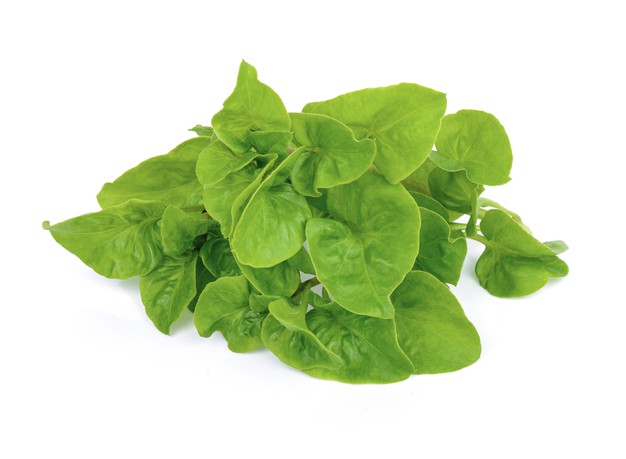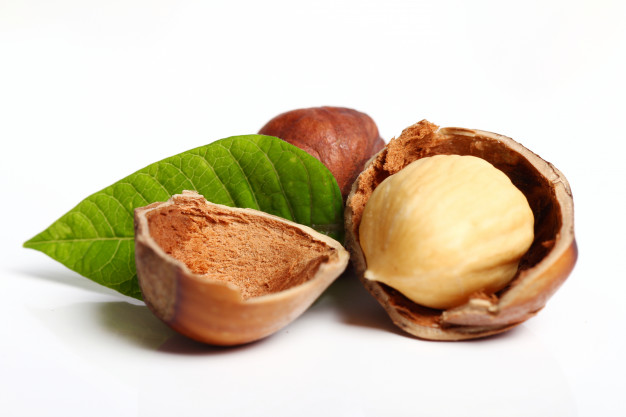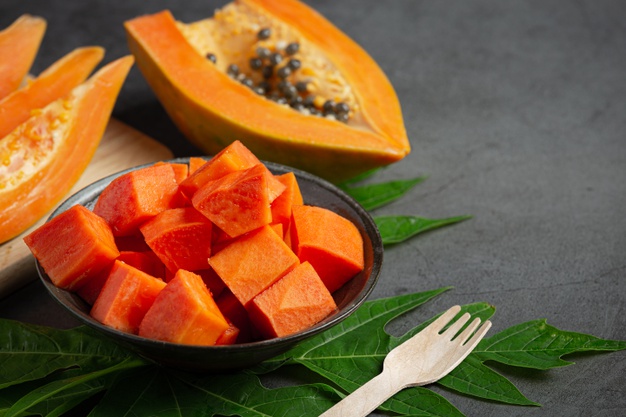Hummus is a tasty as well as healthy condiment and has been widely used for several medicinal purposes. It is extremely rich in proteins, fibre and micronutrients, which offer numerous health benefits as well.
Nutritional profile
- It contains desirable amount of carbohydrates
- It is rich in fibre as well
- It contains good amount of proteins and composed of various important amino acids
- It also contains fats and it is consisting of both saturated and unsaturated fat but does not contain cholesterol
- It is loaded with various important micronutrients like Vitamin B1, B9, calcium, phosphorus, potassium, manganese, magnesium, zinc, copper and iron
- It is also rich in phytonutrients, which are responsible for exerting numerous nutraceutical activities
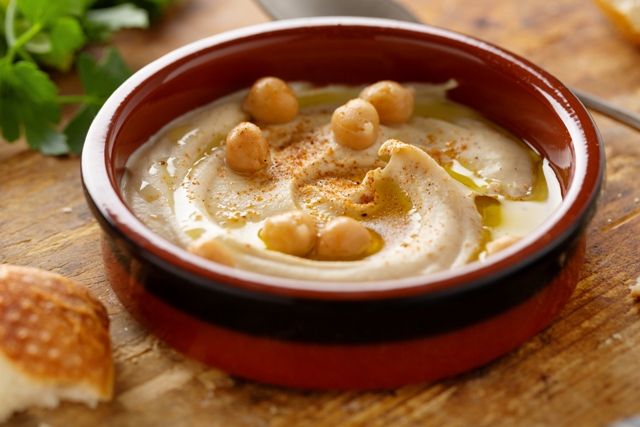
How it is prepared?
Chick peas, tahini, olive oil, lemon juice, garlic and too some extent of salt are required for preparing hummus and finally hummus is obtained by blending all of these ingredients in well manner.
Biological activity
Antioxidant activity
- It contains various important constituents that exhibit antioxidant activity. Olive oil is one of the ingredient of hummus and it is rich in oleocanthal, which is considered as one of the most important components of hummus that acts as antioxidant
- It helps to reduce the concentration of free radicals in body and protects the body from oxidative damages. Furthermore it reduces the susceptibility of developing chronic diseases by decreasing oxidative stress

Anti-carcinogenic activity
- Chick pea is one of the most important ingredients of hummus and chick pea contains saponins and lignans that exert potent anti-carcinogenic activity
- It helps to hinder the growth of malignant cells in body by inducing apoptosis and decreases the risk of developing carcinoma
Anti-inflammatory activity
- Hummus contains various imperative components that help to fight against inflammation
- It helps to decrease the concentration of CRP and IL-6 in body, which ultimately helps in reducing inflammation
- It is also associated with preventing joint swelling thus individual suffer from arthritis should include hummus in their diet for improving their symptoms
- It helps to reduce pain as well
Health benefits
Role on digestive health
- It plays vital role in improving digestive health and all the credit goes to its fibre content
- Its fibre content is responsible for promoting regularity as it is associated with improving bowel movement and it also helps to make the stool soft as well as bulky, which ultimately makes the defecation easy
- It is associated with promoting digestion too
- It helps to support the growth of intestinal beneficial microbes as well. Fibre present in hummus is also fermented by gut bacteria and converted into butyrate, which is related with nourishing the gut as well as the colon and significantly decreases the risk of developing colon cancer

Helps to decrease blood cholesterol level
- In order to obtain a healthy life it is better to keep the cholesterol level at check and consumption of hummus is very effective in this matter
- Chick pea of hummus is considered as the main ingredient that helps in decreasing blood cholesterol concentration
- It plays imperative role in decreasing the level of LDL, triglyceride and VLDL in body thus helps to reduce the prevalence of several chronic diseases like cardiovascular diseases, hepatic disorders, obesity, hypertension, renal disorders etc
- Whereas it helps to improve the concentration of good cholesterol or HDL in body and plays vital role in maintaining a healthy lipid profile by keepingh a good ratio of HDL and LDL
Role on skeletal health
- Bones are considered as one of the most important parts of our body because without bones we cannot do much and cannot move as well. Bones are also associated with protecting internal organs thus we should take proper care of bones
- It has seen that consumption of hummus is directly linked with improving bone health as it contains adequate amount of calcium
- It helps in bone mineralization as well, which ultimately improves bone mineral density
- It is also associated with increasing bone mass. Moreover its consumption is very effective for reducing the prevalence of bone disorders
- Whereas it helps to promote the growth of teeth as well

Role on weight management
- Individual who want to reduce their body weight should consume a diet, which is rich in protein and fibre. Hummus is a good choice for them as it provides adequate amount of proteins as well as fibre
- Proteins and fibres are responsible for delaying stomach emptying thus they help to keep an individual full for long period of time as a result decreases over consumption by reducing appetite and subsequently develops a negative energy balance that ultimately facilitates weight reduction
- Its hypolipidemic activity is also accountable for decreasing the prevalence of visceral obesity
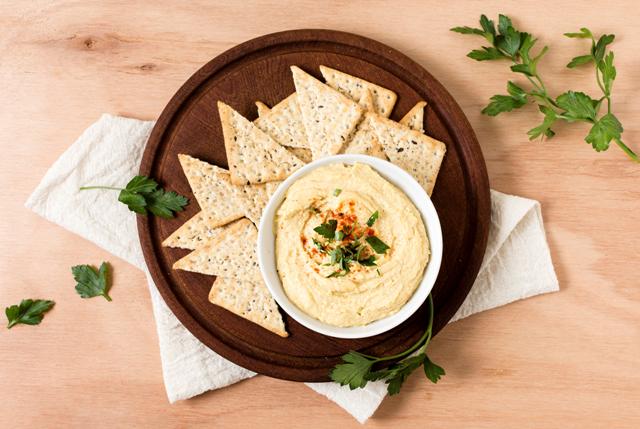
Role on muscular health
- Proteins present in hummus play significant role in improving muscle growth as they act as building block of muscles
- It significantly helps in improving lean muscle mass
- It is also associated with enhancing muscular strength
- It helps to prevent muscular damages as well thus its consumption is thought to be very much helpful for improving muscular activity hence endurance

Role on blood vessels
- Being a protein rich food, its consumption is believed to be very effective for promoting endothelial health
- It is also related with protecting blood vessels from oxidative and inflammatory damages hence helps to promote their activity as a result helps in smooth blood circulation
Role on skin
- Its consumption is thought to be very useful for promoting skin health as it contains various imperative nutrients that help to provide proper nourishment to the skin
- It is also associated with protecting the skin from free radical induced oxidative damages
- It helps to improve skin glow as well
- It also helps to prevent ageing and makes the skin supple
Therapeutic uses
It has been extensively used for various therapeutic purposes, which include –
- It is used as an important therapeutic substance for preventing hyperglycemia. Being a low glycemic food, it is considered as a healthy choice for diabetic patients and for those also who are at risk condition. It plays significant role in decreasing the concentration of glucose in blood. It helps to increase insulin sensitivity as well that ultimately helps in stabilizing blood sugar level. On the other hand its fibre content is responsible for inhibiting glucose absorption from intestinal epithelial cells as a result it helps to decrease postprandial blood glucose load. It has seen that consumption of hummus is awfully useful for improving the symptoms of type 2 diabetes
- It helps to decrease the prevalence of anemia
- Consumption of hummus is extremely effective for preventing allergies as well
- Women suffer from menstrual complication can consume hummus as it helps to make the menstrual cycle easy to bear
- It helps to improve immunological responses as well, which ultimately reduces the susceptibility of becoming ill
- It is also associated with reducing the risk of developing cardiovascular diseases. Its antioxidant activity, micronutrient components, fibre components and hypolipidemic activities are accountable for promoting cardiac health and functionality. It has seen that consuming hummus is related with decreasing the prevalence of atherosclerosis, coronary artery disease, angina pectoris, strokes and heart attacks

Risk factors
Too much consumption of hummus may cause gastrointestinal disorders thus it is better to consume it in moderation.
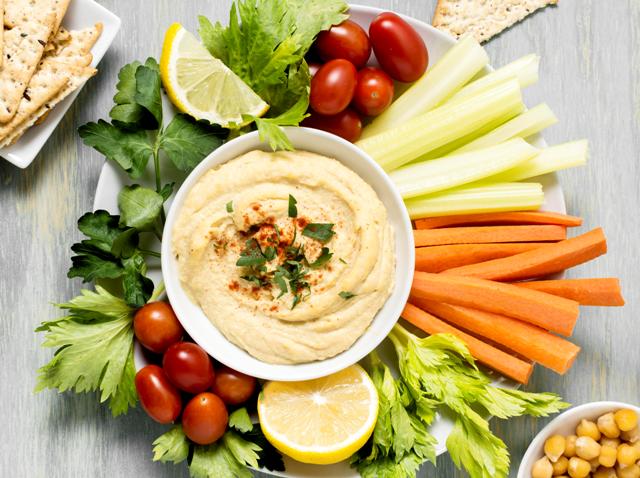
Source:
Frankenfeld, C.L. and Wallace, T.C., 2020. Dietary Patterns and Nutritional Status in Relation to Consumption of Chickpeas and Hummus in the US Population. Applied Sciences, 10(20), p.7341.
Kendall, C., Esfahani, A., Campbell, J., Jenkins, A. and Jenkins, D., 2014. Effect of hummus on postprandial glucose and insulin responses in healthy individuals (1039.6). The FASEB Journal, 28, pp.1039-6.
Reister, E.J. and Leidy, H.J., 2020. An Afternoon Hummus Snack Affects Diet Quality, Appetite, and Glycemic Control in Healthy Adults. The Journal of Nutrition, 150(8), pp.2214-2222.
Reister, E.J., Belote, L.N. and Leidy, H.J., 2020. The benefits of including hummus and hummus ingredients into the american diet to promote diet quality and health: A comprehensive review. Nutrients, 12(12), p.3678.
Wallace, T.C., Murray, R. and Zelman, K.M., 2016. The nutritional value and health benefits of chickpeas and hummus. Nutrients, 8(12), p.766.
